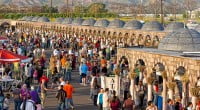Youth address global poverty in Gülen Institute’s essay contest

Date posted: February 28, 2015
MESUT ÇEVİKALP / ANKARA
Hundreds of young people from around the world pondered the issue of global poverty and proposed potential solutions based on their own research and experience in an international essay contest launched by the Gülen Institute, a US-based civil society organization.
The contest has been held five times by the Gülen Institute Youth Platform, with this year’s topic being “Are citizens of the world succeeding in lessening global poverty?”
A total of 1,000 students from 65 countries participated in the contest and the top 30 essays have been chosen by a jury that consisted of members from prominent US universities, including the University of Houston, the University of Houston-Downtown, Texas Southern University, Texas A&M University, San Jacinto College, North American University, Lamar University, Alvin Community College, Midwestern State University, Lone Star College, Prairie View A&M University, Rice University and Tarleton State University.
The students were asked to discuss issues such as: novel innovative methods to combat poverty; innovative practices that have been particularly effective in reducing or eliminating poverty in certain regions; ways of innovating projects aimed at reducing poverty without impinging on cultural practices; and an example of an effective innovation to decrease poverty that utilized social means within a culture without intrusions from civil society or the United Nations. All of the essays had to be written in English and not exceed 2,000 words.
The winners of the contest were announced in January and the award ceremony will take place in Washington, D.C., in April.
First place went to a student from South Korea named Min Byung Chae, who will be awarded $2,000. Second place went to Kuangning Ge from Singapore, who will be awarded $1,500 and in third place, Sung Yeon Kim from Canada, who will be awarded $1,000. Students ranking between fourth and 15th place will be awarded $300 each, while those between 16th and 30th place will be awarded $100. In addition, all 30 students will be given a three-day trip to Washington, D.C., for the award ceremony in April.
Among the students who made it into the top 30 was a Turkish student from the Central Anatolian province of Kayseri, Arif Demirkan. Demirkan, in grade nine at Kılıçaslan High School, wrote an article titled “Responsibilities of civil society and states in combating global poverty.”
Demirkan said he is very happy because he will represent Turkey at the award ceremony in April.
Talking about the way he prepared for the essay contest, Demirkan said: “I heard about the essay contest in September. When I decided to participate in it, I reviewed old articles. Then I chose a topic. For about two months, I researched literature on the Internet and in the libraries. When I had sufficient knowledge on the issue, I began to write my article. Spending one month writing the article, I sent it to the Gülen Institute on Dec. 15. They informed me last month [January] that I was among the winners. I was invited to the US to present my work. This is my first international success.”
The work of the Turkish charity Kimse Yok Mu inspired Demirkan to suggest that global poverty could be reduced by civil society organizations.
“It could be admitted that civil society organizations are more successful in combating global poverty. These organizations create better sources for the people in need in developing countries because the funds they provide could be used everywhere. Since states mostly concentrate on the needs of the people in need in their own countries, they don’t provide much support to the developing countries. I believe that even in developed countries, there should be private organizations that will provide additional support to combating poverty in that country,” Demirkan wrote in his article.
According to World Bank reports, 46 percent of the global population lives on the poverty line with $2 a day, while 21 percent live on the hunger line with $1 a day as of 2014. Combating global poverty is one of the leading agenda items of the UN, which has been developing projects to prevent global poverty since a summit in New York in 2000.
Gülen Institute Chairman M. Sait Yavuz told Sunday’s Zaman that the Youth Platform’s effort to take up the issue of poverty and encourage young people around the world to think about this issue has received appreciation from the international community. He said there were more participants this year than last and that the jury had a difficult time selecting the winners.
“Solution proposals suggested by the Youth Platform, which was launched as a modest initiative in 2011, on global issues receive a lot of attention. While the platform prompts young people to reflect on global problems such as violence, poverty, education, child labor, smuggling, gender inequality and hunger, it gives them the opportunity to see these issues from a global perspective and develop their language and self-expression skills. In other words, it enhances the skills of the future’s leaders,” Yavuz said.
Established in October 2007, the Gülen Institute is a non-profit research organization dedicated to the promotion of peace and civic welfare. The Gülen Institute takes its name from Fethullah Gülen, the popular Turkish author, educational activist, opinion leader and preacher emeritus whose commitment to tolerance and altruism have inspired millions to work for peace. Gülen believes in the possibility of peaceful coexistence among the world’s diverse communities and strives to promote the ideals of service and civic responsibility.

Since 2007, Houston-based Gülen Institute has hosted several non-profit organizations and well-known public figures in order to promote peace and civic welfare.
Source: Today's Zaman , February 28, 2015
Tags: North America | Peacebuilding | USA |
























